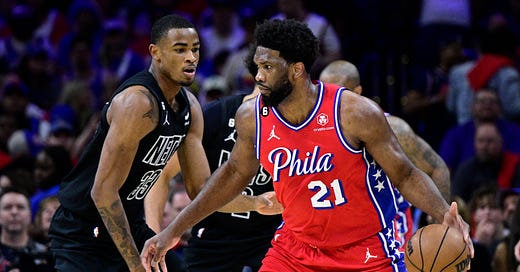The lasting images in my mind of the Sixers’ 121-101 trouncing of the visiting Nets on Saturday in Game 1 of the best-of-seven Eastern Conference quarterfinals weren’t of Joel Embiid bullying his way inside for buckets. Philadelphia’s MVP candidate did drop 26 points on Brooklyn, but the Nets could live with that.
No, what should give Brooklyn nightmares every night until Monday’s Game 2 are visions of Sixers forward P.J. Tucker outhustling them for offensive rebounds and Nets guard Spencer Dinwiddie’s lob accuracy being the basketball equivalent of Bull Durham’s Nuke LaLoosh.
The Nets came into the series as heavy underdogs, so they could ill afford to lose the effort categories. Yet it was the Sixers who came away with 34% of their missed shots and the majority of loose balls, won the turnover battle, 20-9, and took more charges.
Though he only logged 25 minutes, Tucker was in the middle of a bunch of those momentum-altering sequences. He grabbed five of Philly’s 14 offensive rebounds and was credited with five of their 14 steals.
The Nets were one of the worst defensive rebounding teams in the league this season, surrendering 14.6 second chance points per game. The Sixers had that many by the end of the third quarter, finishing with 21. Some of the extra possessions were understandable given Brooklyn’s defensive strategy of doubling Embiid and then scrambling to find the other bodies. However, there were several balls that hit the floor after caroming off the rim. Tucker was often first to those balls and they would inevitably lead to a Sixers three-pointer. On other rebounds, he simply outworked Cam Johnson and Royce O’Neale, with Nets Head Coach Jacque Vaughn appearing to be furious after one of O’Neale’s soft boxouts going into a first quarter timeout.
He was right--it’s inexcusable.
So was Dinwiddie’s execution on lobs, a problematic issue for him since his first go-round as a Net from 2016-2021. You can’t convince me that he isn’t the worst passing starting point guard in the NBA, no matter how many assists he racks up. Though the league registered four Dinwiddie turnovers on Saturday, my unofficial count of blown alley oops was five. Some weren’t even close and most of those ignited Sixers transition opportunities. Dinwiddie should play ESPN’s Beth Mowins’ calls, “It’s a five-point swing!” on a loop.
You could argue with some of Vaughn’s game plan—I happened to agree with the limiting Embiid priority despite it helping the other Sixers go an unconscious 20-for-38 (52.6%) from deep before garbage time. I’m not sure why Vaughn decided to employ a zone defense in the second quarter when Embiid was OUT of the game, thereby giving the spaced Sixers even more room to hoist 3s, and I thought Dorian Finney-Smith was underutilized, but that’s probably nitpicking.
Because the overriding problem was that even if Philly had been a little off, the Nets would have still been deeply underwater due to their own foibles.
The bottom line is that the Nets couldn’t have asked for a better shooting outing on the road against a very good defensive team—55.7% overall and 44.8% from three-point ranges—and they still got blown out. I shudder to think what’s going to happen when the Sixers continue their adjustment to limit Mikal Bridges’ touches (he had two field goal attempts in the second half) and the rest of his teammates revert to their shooting means.
It was always meant to be a tough haul for Brooklyn in this series given their talent deficit—Embiid can wreck a game all by himself and the Sixers were the league’s best three-point percentage shooting team during the regular season. If they’re on their game, you just tip your hat to your opponent.
But the Nets have absolutely no shot at simply being competitive in any game this series if they don’t control the controllables.




"The basketball equivalent of Bull Durham's Nuke LaLoosh" :)